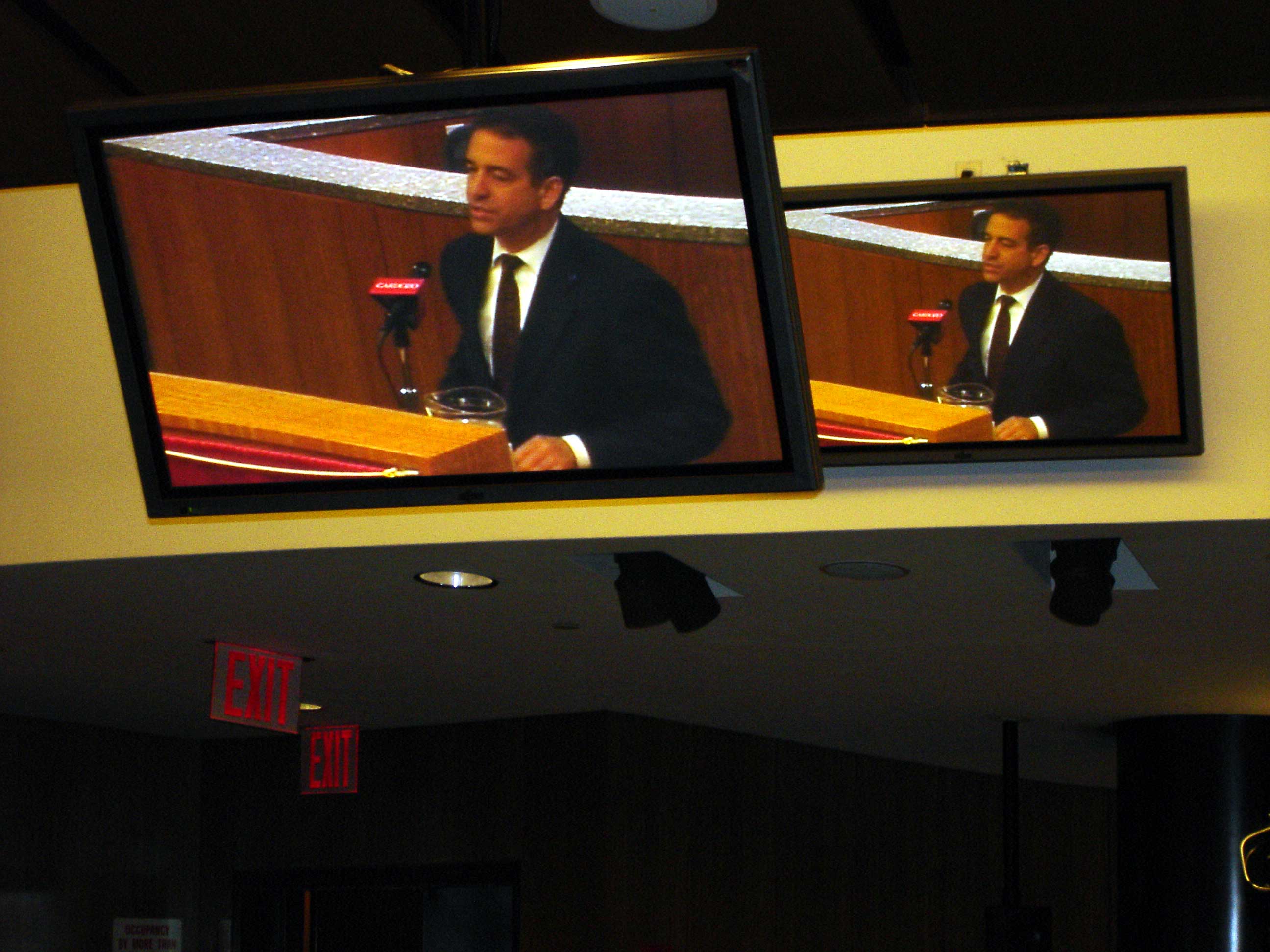“In some sense, the president is now as much a prisoner of Guantanamo as the detainees…The endgame in the war on terror isn’t holding the line against terrorists. It’s holding the line on hard-fought claims to absolutely limitless presidential authority.” Slate‘s Dahlia Lithwick discerns the method in Dubya’s madness on the civil liberties front: “expanding executive power, for its own sake.“
Category: State Secrets
Robbing for Roberts?
Did White House officials steal a file on John Roberts’ affirmative action record from the National Archives last year? “This investigation is unresolved and the file is still missing,” says a new report by the Archives Inspector General, which Tim Noah dissects over at Slate. (Hmmm…was it reclassified, perhaps?) Still, according to the report, a White House staffer was the last person known to have the file, and “[t]he report’s findings contradicted the assertions of Archives officials, who said last August that an attendant had been in the room at all times and that the lawyers had been separated from their bags.” The mystery deepens…
Malreports from Minitrue’s Recdep.
“In short, more than one of every three documents removed from the open shelves and barred to researchers should not have been tampered with.” A recently-completed audit into the formerly secret Archives reclassification program finds that many more files were reclassified — and reclassified wrongly — than previously suggested. “In February, the Archives estimated that about 9,500 records totaling more than 55,000 pages had been withdrawn and reclassified since 1999. The new audit shows the real haul was much larger — at least 25,515 records were removed by five different agencies, including the CIA, Air Force, Department of Energy, the Federal Emergency Management Agency and the Archives.“
No More Secrets.
“For the National Archives to go into cahoots with the CIA and Air Force to mislead researchers about what was going on was over the top, and a strong signal of a secrecy system that is genuinely broken.” Following the recent uproar over re-classified documents, the National Archives pledges to forego secret arrangements in the future. Said the United States archivist, Allen Weinstein: “Classified agreements are the antithesis of our reason for being…If records must be removed for reasons of national security, the American people will always, at the very least, know when it occurs and how many records are affected.“
The End of History.
And hundreds of fifth-graders in day-glo hats lamented…The Smithsonian American History Museum will be closed for two years as of Labor Day, to allow for interior renovations and a new display for the Star Spangled Banner. And in vaguely related news (and as noted previously here), the Post looks into the plan by the CIA, Air Force and others to file away some records…forever. (2nd link via Cliopatria.)
Secret Garden.
“It is also worth noting that much of this reclassification is being conducted by junior officers, or in many cases private contractors who know nothing about the historical context of these documents and nothing about whether the contents are sensitive or innocuous. One military historian told me that some of these junior contractors have been instructed simply to reclassify anything bearing the words ‘atomic’ or ‘restricted data,’ regardless of what else the documents might or might not contain.” Fred Kaplan offers up more info on the highly suspect re-classifying program currently underway at the National Archives.
Whitewash at the Archives.
“The stuff they pulled should never have been removed…Some of it is mundane, and some of it is outright ridiculous.” As recently uncovered by intelligence historian Matthew Aid, the National Archives has been re-classifying thousands of once publicly available documents at the behest of unknown (re: still-classified) government agencies since 1999. “While some of the choices made by the security reviewers at the archives are baffling, others seem guided by an old bureaucratic reflex: to cover up embarrassments, even if they occurred a half-century ago. One reclassified document in Mr. Aid’s files, for instance, gives the C.I.A.’s assessment on Oct. 12, 1950, that Chinese intervention in the Korean War was ‘not probable in 1950.’ Just two weeks later, on Oct. 27, some 300,000 Chinese troops crossed into Korea.” Aid posted his account of the sordid tale today at the National Security Archive.
Big Russ.
With a tip-off from the Progressive Patriots Fund, I had the opportunity yesterday to catch Sen. Russ Feingold speak on the Patriot Act and the NSA wiretapping scandal over at Cardozo Law School. (Their pics are a lot better than mine — I forgot to charge my batteries, and thus only got in 2 or 3 shots before my camera died on me.) And how was he? Well, all-in-all, he came off as a convincing candidate for the election ahead, as well as an impressive, informed, and personable fellow. To be honest, I found his remarks a bit lawyerly (then again, he’s a lawyer speaking before a law school, so that’s not really a fair criticism), but, taken in full, he seemed a committeed progressive and a refreshingly candid leader, the type of dynamic, independent thinker the Senate should be teeming with, if the system came anywhere close to working these days.
The gist of Sen. Feingold’s remarks was thus: Al Qaeda is the central threat facing America and has been since 9/11. Yet, instead of bringing the nation together to eliminate this terrorist organization, the Dubya White House has chosen time and time again to endanger our national security and compromise our most fundamental American values for their own ideological or power-hoarding purposes. (Iraq, Guantanamo, extraordinary rendition, secret gulags, you name it.) Along those lines and as we now all know, the Patriot Act, which only Feingold voted against in 2001, contains some terrible provisions therein, the most notorious example affecting Middle America being Section 215 (which gives law enforcement, among other things, the right to see what you’ve been reading.)
Yet, as per the norm, Dubya has refused to admit that it’s even possible that something might be wrong with the Patriot Act now that it’s up for renewal — only that it’s necessary to defeat the evildoers and that any microscopic change in the statute could rend the fabric of freedom irreparably. (Despite this now-somewhat hoary ploy, Feingold and others have succeeded in blocking a permanent blanket extension for now, as y’all know if you’ve been visiting here lately.) And, of course, Dubya has taken this same tack of obfuscation and fear-mongering to cover up his brazen wiretapping power-grab — which, according to Congress’s own research arm, broke at least two laws and counting.
Again, this story is not news to many Dems out there, but Feingold laid it out in clear, comprehensible, and systematic fashion. (The only “breaking news” made was the Senator announcing this letter to Gonzales, asking him why he, in effect, lied to the Judiciary Committee during his confirmation hearings about the NSA wiretaps.) And he had some good lines throughout — In reply to Rove’s ridiculous claim that Dems were “pre-9/11”, Feingold quipped that the GOP suffered from a “pre-1776” mentality these days. (He also retold the recent Patrick Henry exchange.) To be honest, I’d liked to have heard more in this vein — In terms of breaking down the legislative legerdemain and legal issues at hand, Feingold was superb. But I thought the speech needed more narrative sweep and rhetorical grandeur, more explanation of why this battle matters so much to the workings of the republic. He doesn’t have to turn into Robert Byrd overnight. Still, I thought the remarks could have benefited from more dramatic heft and historical resonance: Jefferson, Madison, Adams, Lincoln, Wilson…they’re all relevant here. (Then again, as I said above, I was an historian sitting in a room full of lawyers, so I was a tougher sell than most.)
Along those lines, if there was a problem with this presentation, it’s that the Senator, while clearly outraged, at times seemed much less livid about all this than many in the audience, who occasionally sounded ready to hoist the black flag. (In fact, many will no doubt be happy to hear that Feingold was asked twice “why Democrats are so lame.” As he noted (and as the blogosphere can attest this week), if a crowd in New York City is this irate with the party, the Dems might be in serious trouble nationwide in November. Still, he also emphasized that the Democrats could be more effective fighters if they actually controlled a house of Congress — You can’t hold hearings if you’re in the minority.
In terms of other questions, Feingold said he supports and will take part in the very late-developing (and now already defunct) Alito filbuster (Roll Call.) In fact, he thought the Dems made a crucial mistake in capitulating to the original “Gang of 14” compromise, arguing cogently that Dems have seen nothing for it and may well have had the votes to win Catkiller‘s game of nuclear chicken. Since Casino Jack and lobbying reform seemed too big a subject to address competently in the time allotted, I asked him a question about his thoughts on the NYT decision to spike the NSA story for a year, his general view of the mass media’s performance in serving as a check on these types of executive abuses, and (’cause it seemed apropos) his thoughts on the burgeoning blogosphere’s role in all this. He didn’t really go after the Times decision, and said that, in terms of the recent Patriot Act debate, he thought the press had actually done an ok job. Regarding blogs, he called the Internet “a miracle for populist politics,” which was a good enough soundbite that everyone in my row dutifully wrote it down at the same time.
And, of course, Sen. Feingold was asked — a couple of times — whether or not he was running for President in 2008. Naturally, he played it coy — After all, we still have just under two years before the Iowa caucus. But, for what it’s worth, I was impressed by him — He’s not a first-class emoter like Edwards or Clinton, of course. Instead, he comes across as a highly intelligent, capable, and nuanced thinker, a la Bradley, Kerry, or Gore on his better days. But unlike those three, he also seemed much more comfortable in his own skin, more naturally himself at the podium, and — most importantly — more content to play the maverick if his lefty principles dictate thus. (Although, as I said, I’d like to see him tone down the lawyer-ese and rev up more Wellstone-ish fire if he does make a White House run.) I suppose there’s a small, bordering-on-infinitesimal chance that Rodham Clinton, Biden, Warner, or someone else might drop all the “New Democrat” protective camouflage this time around and begin loudly and undefensively proclaiming progressive principles to the Heavens. But, until that unlikely event, my candidate in the 2008 Democratic primary is Senator Russ Feingold of Wisconsin. (Update: 1776 link via Medley.)
“The Power-Madness of King George.”
 “This extremity of Bush’s position emerges most clearly in a 42-page document issued by the Department of Justice last week. As Andrew Cohen, a CBS legal analyst, wrote in an online commentary, ‘The first time you read the “White Paper,” you feel like it is describing a foreign country guided by an unfamiliar constitution.’ To develop this observation a bit further, the nation implied by the document would be an elective dictatorship, governed not by three counterpoised branches of government but by a secretive, possibly benign, awesomely powerful king.” As Dubya embarks on another weeklong campaign of fear and distortion (as per standard Rovian operating procedure), Slate‘s Jacob Weisberg gapes at the audacity of Bush’s brazenly unconstitutional ploy for power. “[I]n his white paper, Bush as much as declares: ‘I determine what my words mean and I alone determine what yours mean, too.’…Bush’s message to the courts, like his message to Congress, is: Make way, subjects.“
“This extremity of Bush’s position emerges most clearly in a 42-page document issued by the Department of Justice last week. As Andrew Cohen, a CBS legal analyst, wrote in an online commentary, ‘The first time you read the “White Paper,” you feel like it is describing a foreign country guided by an unfamiliar constitution.’ To develop this observation a bit further, the nation implied by the document would be an elective dictatorship, governed not by three counterpoised branches of government but by a secretive, possibly benign, awesomely powerful king.” As Dubya embarks on another weeklong campaign of fear and distortion (as per standard Rovian operating procedure), Slate‘s Jacob Weisberg gapes at the audacity of Bush’s brazenly unconstitutional ploy for power. “[I]n his white paper, Bush as much as declares: ‘I determine what my words mean and I alone determine what yours mean, too.’…Bush’s message to the courts, like his message to Congress, is: Make way, subjects.“
In related news, Senate opposition to the Patriot Act — All the Dems and only four measly Republicans — seems to be holding firm for now, meaning that the old, unrevised version will remain in effect for the time being. Of course, if King George actually possessed the powers he’s arrogantly allocated to himself of late, there would be no need for a Senate vote on the Patriot Act at all. Hopefully, Arlen Specter understands the danger in these breathtaking assertions of unconstitutional power by Dubya, and will make his forthcoming Senate Judiciary hearings count for something. After all, given this administration’s blatant power grab, it’s no longer hyperbole to say that our republic is at stake.
Lies about Lies.
Thanks to more lies emanating from the Dubya administration, the Congressional Research Service is forced to set the record straight: Dubya saw more prewar intelligence than Congress. “The Bush administration has routinely denied Congress access to documents, saying it would have a chilling effect on deliberations. The report…concludes that the Bush administration has been more restrictive than its predecessors in sharing intelligence with Congress.“




